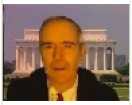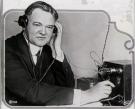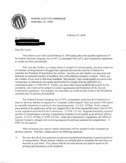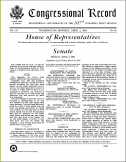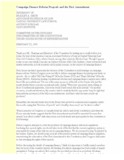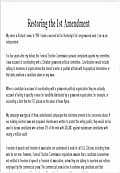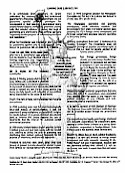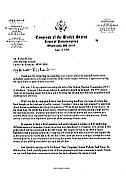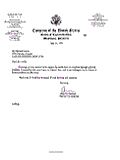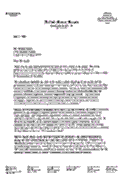
Click Thumbnails for Details
The 1st Amendment is not a loophole in federal campaign law! Federal Campaign Law is a violation of 1st Amendment rights!

Senator Reid's letter
to FEC Chairman Thomas
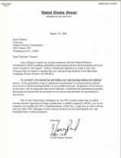
Congressman Hensarling's
Dear Colleague Letter

Follow Daily Developments
on RedState.org
Fight Tyranny with Keystrokes
Federal campaign reform is cancer of the 1st Amendment. The carcinogens are Pew and 7 other liberal trusts that spent a hundred million plus over a decade astroturfing the appearance of demand for reform. The battle to keep the internet free is the patients only hope. Prognosis depends on mobilizing the real grassroots, We the People.
On March 4, 2005 Commissioner Bradley Smith of the Federal Election Commission blew the whistle and exposed the threat to free political speech on the internet. Read his statements on Zdnet and Worldnet Daily.
The Federal Election Commission began rulemaking hearings on April 4, 2005. Do you want to familiarize yourself with terms like: political action committee (PAC), independent vs. in-Kind donations, issue vs. express advocacy, spending limits, reporting intervals and coordination with a candidate’s campaign, before engaging in political discussion on the web? And remember failure to comply with campaign finance laws is a felony! Public input will be accepted until June 3rd so visit http://www.fec.gov/law/law_rulemakings.shtml and make the best of this opportunity. Send email, faxes and snail mail objecting to the application of the Bipartisan Campaign Act to politics on the web. This is America’s last chance to keep a vestige of freedom of speech, press and assembly guaranteed by the 1st Amendment.On March 17th Senator Harry Reid (D) of Nevada introduced a bill, S 678 IS, to exempt Internet communications from campaign finance laws. The bill reads: Paragraph (22) of section 301 of the Federal Election Campaign Act of 1971 (2 U.S.C. 431(22)) is amended by adding at the end of the following new sentence: "Such term shall not include communications over the Internet." Senate bill S.678 is now bi-partisan: Senator Tom Coburn (R) of Oklahoma is co-sponsoring. Email your senators, www.senate.gov/ and ask them to sign on to the above bill.
On April 13th Congressman Jeb Hensarling (R) of Texas [5th] introduced an identical bill, HR 1606, in the House of Representatives. The house bill is cosponsored by Congressman Tim Ryan (D) of Ohio [17th], Congressman Jeff Flake of Arizonan [6th] , Congresswoman Marilyn N. Musgrave of Colorado [4th] and Congressman Ron Paul of Texas [14th]. Email your congressman and ask them to sign on. You can find your Congressman's email address at www.house.gov/.DownsizeDC.org is conducting an online lobbying campaign to get Congress to pass this legislation. People can use DownsizeDC's Electronic Lobbyist to ask their Representative and their Senators to sponsor this bill. They can do so by clicking here http://action.downsizedc.org/wyc.php?cid=22
Consider writing complaints to the FCC as well. Broadcast TV uses the public air waves and licenses are up for renewal from now until August.
On Monday, April 18 I sent the following complaint to the FCC (fccinfo@fcc.gov) and FCC Commissioners (KJMWEB@fcc.gov; Kathleen.Abernathy@fcc.gov; Michael.Copps@fcc.gov; Jonathan.Adelstein@fcc.gov). I have not received a reply yet?
Good morning
Please note my complaint is time sensitive. The public has until June 3rd to participate in the FEC rulemaking regarding the application of the Bipartisan Campaign Reform Act to public communications on the internet.
I have not seen any TV coverage, local or national, on the battle to keep the internet free from FEC regulation and believe the story is being spiked out of self interest and is not in the public interest. I have contacted many of the television stations in Tampa, Florida asking them to do a story and have not received a reply. I have also sent emails to CBS, ABC, NBC, Fox, CNN and Face the Nation.
Why do some stories not get told? Maybe those in power make sure they don't!
Face the Nation on April 10, 2005 hosted Senate Minority Leader Harry Reid, whose recent bill, S.678, would exclude the Internet from regulation and Senator John McCain, who co-authored the Bipartisan Campaign Reform Act. Yet the topic of the Federal Election Commission vs. the Internet was not mentioned.
The new technology of the internet permits every citizen an electronic soap box. Maybe the old, unregulated, mainstream media spiked the story out of self interest and just doesn't want the competition.
But the Battle for the Internet is America's last chance to keep a vestige of freedom of speech, press and assembly once guaranteed by the 1st Amendment and is definitely in the public's best interest.
Sincerely,

Free Speech Needs Jerry Maguire
By Ryan Sager Published 03/18/2005 - http://www.techcentralstation.com/031805G.htmlExcerpt:
That's because campaign-finance reform is not a "movement" as its proponents have claimed, it is a lobby -- funded and orchestrated by eight very liberal foundations which fooled Congress and the American people into believing that the front groups they set up were grassroots organizations.
Click adjacent thumbnail to read the entire article, reprinted by permission of Tech Central Station
There Are No 'Federal' Elections
By Ben DoubleCrossed
Please encourage your Congressman to co-sponsor Representative Roscoe Bartlett's “First Amendment Restoration Act” — HR 46.
There are no 'Federal' elections, only elections for federal office held in the states. The Federal Election Commission is not the solution to corruption in Federal Politics ... it is the corruption of Federal Politics!
Ask yourself the question: who is better suited to regulating federal politicians, federal politicians or state politicians and the people? The founding fathers delegated authority for holding and regulating elections to the states and the people:
Amendment 10 - Powers of the States and People
The powers not delegated to the United States by the Constitution, nor prohibited by it to the States, are reserved to the States respectively, or to the people
The Federal Election Commission's claim to jurisdiction over 'Federal' elections is both constitutionally and historically bogus.
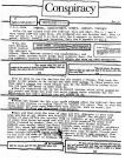
Conspiracy Theory
by Ben DoubleCrossedIf the special interests are half as powerful as we have been led to believe why shouldn’t we believe they crafted the Campaign Reform laws?
Purpose of Campaign Laws
The need for Federal Campaign reforms hinge on the potential of big contributions to buy influence in public matters. As a consequence, candidates are limited in how much they can accept from any given donor and required to make public reports, at regular intervals, listing the names, occupations, addresses of donors and their amounts. Furthermore, the candidate must provide public reports stating how the funds are spent.Who is Exempt
The preceding sounds like a reasonable and laudable public goal but who is exempted from contributions that influence public matters?
Nad Blather on: Freeing the pulpit to speak on politics
Republican Congressman Walter Jones, representing North Carolina's 3rd District, has introduced legislation (H.R. 235 - the Houses of Worship Free Speech Restoration Act of 2005) to protect churches (501-3c corporations) from anxiety that the IRS might take away their tax exempt status if they get to political. An unjust law introduced in 1945 by then-Senator Lyndon Baines Johnson is the basis for pastor’s fears.This is good legislation and deserves support. Christian churches in early America, especially after The Great Awakening of 1740, had a great deal to do with establishing the sentiment that led to the Revolutionary War and the ousting of the British. In fact, until sometime in the 1940s, if a man wanted to run for office he tossed his hat in the ring at church. If the hat came sailing back he might as well forget it.
Nonetheless, I ask why Christian ministries and Congressmen are not also sponsoring legislation to restore 1st Amendment rights of free speech, press and assembly for all Americans.
The founders believed that our Creator gave every individual certain unalienable RIGHTS but instead of unrestricted and equal ‘individual rights” we now participate in our political process through a system of "limited collective rights" (a socialist idea). But first we are required to “create a corporation" (a fascist idea). Thereby We the People trade rights endowed by our CREATOR for privileges licensed by GOVERNMENT!
Nad Blather Anchors the News
* New Satire
Blad Nather MP3 Broadcast
*New Satire
On Feb 6, 2004 I requested an Advisory Opinion from the FEC and they replied my questions were to general. But IMHO
they are relevant to the BCRA 2005 internet rule making:1. Can I, as an independent expenditure by a single citizen or as part of a citizens group, put up web pages, or continue an existing web page expressly advocating the election or defeat of a candidate for president 29 days before the election? If so, must I include a disclaimer stating who paid for the web pages and provide reports to the FEC?
2. Can I print handbills from a presidential candidate’s website on my home printer and distribute any number of them? Would printing and distributing constitute an in-kind donation? Could I use a personal copier to speed the process? Am I limited to $2000 in paper, ink and toner or may I print a quantity equivalent to my local newspapers circulation?
3. If I title my handbill “My Gazette” do I qualify for the newspaper exemption or would it still be an “independent expenditure”? Noah Webster’s dictionary defines a newspaper as apiece of paper on which is caused to be printed information or advertisement for the purpose of public distribution.
Apparently I could have done some if not all the above but the Speech Police did not know or would not answer. America needs to restore the 1st Amendment as it was understood prior to 1974 when few questions needed to be asked about how to participate in our democracy. Law is supposed to mean fixed and apply equally to all. Advisory Opinions on a case by case basis smack of feudal times and the FEC isn’t Camelot.
Some are More Equal than others
The Socialist Workers Party National Campaign Committee and committees supporting candidates of the Socialist Workers Party (SWP) remain exempt from some FEC disclosure requirements for political committees. See advisory opinion AO 2003-2
It is often useful to examine exceptions to rules when attempting to understand their necessity. The following thoughts come to mind when contemplating this exemption:
Is this a great country or what? We bend over backwards to accommodate those who would destroy our way of life.” If you want to overthrow the government of the United States and replace it with a Communist Dictatorship you are exempt from Federal Election Commission regulations that require the disclosure of personal information.
Does the FEC need Tort Reform?
Click the adjacent document thumbnail for an example of the Federal Election Commissions poor use of court system and tax money. Although the parties were found not guilty of the most serious charge, 'coordination', the victory became moot when the definition of coordination changed during the proceedings. (several definitions of coordination have failed a constitutional test.) This MUR began in 1994 and is still in litigation after 11 years although there is little to justify the pursuit:
Tim Hardy, who ran and lost the Republican primary for Kentucky's 3rd District Congressional seat:
• Acknowledged that an inadvertent error by a campaign staff member caused his committee—without his knowledge or authorization—to violate 2 U.S.C. §441b by accepting an in-kind corporate contribution through the use of a corporate bulk mail permit;
• Agreed to pay the FEC $250 within thirty days of the agreement pursuant to 2 U.S.C. §437g(a)(6)(B); and
• Agreed to make a good faith effort to establish procedures to prevent his campaign from accepting corporate contributions should he run for federal office in the future.
The court concluded that three of 7 flyers published by Freedom's Heritage Forum contained express advocacy and should have had disclaimers. The court imposed a $3,000 penalty—$1,000 for each violation but litigation continues.
In my opinion Freedom's Heritage Forum counsel has raised legitimate Constitutional questions that were dismissed in error or need to be continued in a different forum.
President's statements on signing the Bipartisan Campaign Reform Act are confusing and unsettling.
Does the act encourage or discourage individual participation? Are the provisions of the Act Constitutional?Don't the President and Congress have an obligation to make certain, to the best of their abilities, that new laws are constitutional prior to enacting them? Isn't reasonable caution implied in their oaths of office? If there are Constitutional questions, wouldn't it be better to err on the side of caution?
Click the adjacent thumbnail for the full text of "President Signs Campaign Finance Reform Act" from the Office of the Press Secretary March 27, 2002. I have emphasized statements I question using a red font face and provide commentary in an adjacent column.
Senator McConnell Smelled the Pew in 2001Senator McConnell exposed the charitable trusts behind BCRA in the Congressional Record of Arpil 2, 2001. Mitch deserves credit for his insight and integrity. Click the adjacent thumbnail for excerpts and follow the hyperlinks to full text of his speech. It is prophetic and well worth the read.
The blogosphere is buzzing with talk of stopping the draconian language of McCain's awful bill from impinging on the denizens of the web. I encourage Mitch to once again ride to the defense of the 1st Amendment by signing on to Senator Harry Reid's Bill(S 678 IS). A bipartisan Reid/McConnell bill could counter McCain/Feingold and keep the internet exempt
Campaign Finance Reform Proposals and the First Amendment
TESTIMONY OF BRADLEY A. SMITH - FEBRUARY 27, 1997
COMMITTEE ON THE JUDICIARY
SUBCOMMITTEE ON THE CONSTITUTION
UNITED STATES HOUSE OF REPRESENTATIVES
--------------------------------------------------------------------------------
When a member of Congress so casually treats his oath to uphold the constitution; and when the House minority leader suggests that the First Amendment must itself be amended because free speech "is in direct conflict" with democracy, it is both timely and appropriate for this committee to hold hearings.
Before congress attempts to solve the problems of campaign finance with more regulations burdening free speech rights, we should take stock of the fact that the current regulatory system is responsible for many of the evils we see in campaign finance. We do not need to plug "loopholes" in the system. Rather, we should scrap most all of the present system of campaign finance regulation, remembering the admonition of the First Amendment to the Constitution, that Congress shall make no law abridging the rights of free speech.
Congress just doesn't seem to get it, freedom of the press was guaranteed to "living beings", the people of the United States, not domestic or foreign corporations! Corporations did not inherit their rights from living citizens, until 97 years after ratification of the Constitution.In the name of leveling the playing field, campaign finance reform has restricted and discouraged the rights of citizens to participate and created an issue and advocacy monopoly for the corporate press!
Granting exemptions from laws is tantamount to creating "privilege" for corporations! The Constitution does not recognize privilege or superior and inferior rights and requires laws be equally applied to all United States Citizens! In 1886 the Supreme Court decreed corporations would have the same rights as a person and not superior rights.
Outrageous Result of Federal Campaign Law
By Ben DoubleCrossed
While the First Amendment of the United States Constitution does in fact guarantee an unrestricted, free press to foreign citizens and corporations operating newspapers in these United States, it [ does not ] guarantee the same rights to United States Citizens or political organizations including the Democrat and Republican parties!
The outrageous paragraph above accurately describes the result of campaign regulations passed by the US House of Representatives and the US Senate, signed into law by the President and upheld by the Supreme Court.
The Federal Election Campaign Act (FECA) prohibits any foreign national from contributing, donating or spending funds in connection with any federal, state, or local election in the United States, either directly or indirectly.- http://www.fec.gov/pages/brochures/foreign.shtml#Prohibition And foreign corporations are considered foreign nationals - http://www.fec.gov/pages/brochures/foreign.shtml#Who_Foreign_National
Nonetheless, foreign owned newspapers have more rights than US citizens because Congress does not want to debate 1st Amendment questions raised by the Press Exemption.
"The fact is Congress can no more dictate how a group of citizens can participate in our democracy than we can limit newspapers, television or radio stations or magazines. By limiting what other groups can say about us as candidates, we are encroaching on their freedoms and increasing the overall impact the press can have on elections. One need only look at the editorial page of the newspaper in my own district to see the complete lack of objectivity one editor can have. Considering the circulation of one newspaper, the broadcast capability of one radio station, the ability of the media to convey a message and impact an election is enormous. Limiting the First Amendment rights of a portion of the population while protecting those of the media is dangerous.In Congress, we have an obligation to protect our democracy. This is not about headlines and winning the public relations war. It's about the system of government we will leave our children.
Oppose legislation that assaults the Constitution. Oppose Hutchison. Oppose Shays-Meehan." Content of June 25. 1998 letter from Congresswoman Northup to her colleagues and Richard Lewis.
"The First Amendment of the Constitution, enacted over two hundred years ago, is America's premier political reform:"Congress shall make no law respecting an establishment of religion, or prohibiting the free exercise thereof; or abridging the freedom of speech, or of the press; or the right of the people peaceably to assemble, and to petition the Government for a redress of grievances."
That is a powerful statement and should be the touchstone of all campaign finance reform efforts. The First Amendment ensures that, among other things, citizens can participate in politics through publicly disclosed contributions to the campaigns of their choice. It also allows citizens to spend their own money, independent of any candidate, to influence election outcomes via letters-to-the-editor, pamphlets and even expensive television advertisements. And the First Amendment gives billionaires the freedom to spend as much of their money as they want to in support of their own candidacy -- whether you or I happen to like it or not. This is simply not my opinion, it has long been the position of the Supreme Court. Political speech enjoys more constitutional protection than commercial speech." Excerpt from October 18, 1996 letter from Mitch McConnell to his constituent Richard Lewis.
Section 431(9)(B)(i) makes a distinction where there is no real difference: the media is extremely powerful by any measure, a "special interest" by any definition, and heavily engaged in the "issue advocacy" and "independent expenditure" realms of political persuasion that most editorial boards find so objectionable when anyone other than a media outlet engages in it. To illustrate the absurdity of this special exemption the media enjoys, I frequently cite as an example the fact that if the RNC bought NBC from GE the FEC would regulate the evening news and, under the McCain-Feingold "reform" bill, Tom Brokaw could not mention a candidate 60 days before an election. This is patently absurd.Had the Senate debate on the McCain-Feingold bill advanced to the point of amendments, among the first I offered would have been one to delete section 431(9)(B)(i). Whenever the opportunity presents itself in the future, I look forward to doing just that. I believe it would be an enlightening discussion. Indeed, the issue was frequently raised during the floor debates in 1997 and 1998 and helped to crystallize for Senators and the C-SPAN viewing audience that the campaign finance debate is, indeed, a discussion of core constitutional freedom." Excerpt from Mitch McConnell's July 8, 1998 letter to his constituent Richard Lewis.
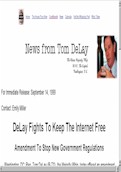
For Immediate Release: September 14, 1999Contact: Emily Miller
DeLay Fights To Keep The Internet Free
Amendment To Stop New Government Regulations
Washington, DC: Rep. Tom DeLay (R-TX), the Majority Whip, today offered an amendment to the Shays-Meehan campaign reform bill to exempt the Internet from the bill’s draconian speech regulation. The DeLay amendment would only apply to free speech aspects of the Internet, not to political fundraising.

Until the "corporate press" exemption is addressed, the ombudsman at the newspaper office acts as the gatekeeper of free political speech. If the newspaper prints your political comments about an issue or candidate, your advocacy may reach a circulation of hundreds of thousands and you enjoy the same exemption from campaign finance spending limits and reporting requirements as the Lexington Herald Leader or Louisville's Courier-Journal.If the newspaper rejects your article and you decide to deliver your message door to door via handbills, you need to visit the State Board of Election Finance Registry and familiarize yourself with terms like: political action committee (PAC), independent Vs in-Kind donations, issue Vs express advocacy, spending limits, reporting intervals and coordination with a candidates campaign. If that isn't daunting enough to discourage you from participating, remember failure to comply with Campaign Finance Laws is punishable as a Class D felony.


